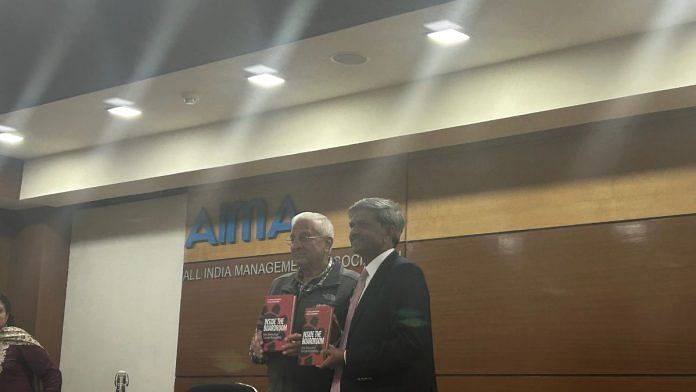New Delhi: If there’s any person who knows what happens behind the closed doors of boardrooms it is R Gopalakrishnan. He has sat on the boards of Tata Power, Castrol India and Tata Technologies among others, and served as the vice chairman of Hindustan Unilever. But his new book, Inside the Boardroom: How Behaviour Triumphs Rationality, which he has co-authored with economics professor Tulsi Jayakumar, is not a gossip-filled exposé. It has no details of CEOs clashing with board members.
“This is not a gossipy book,” said Gopalakrishnan, while admitting that its title gives the reader the impression that it is an insider account of corporate houses. With this caveat, Gopalakrishnan set the tone for the launch of his 18th book at the All India Management Association (AIMA) in Lodhi Road, Delhi.
Instead, he uses this as an opportunity to explore human behaviour, rationality and judgment, and how they play out within the confines of corporate boardrooms. And yes, more often than not, behaviour does triumph over rationality.
“The popular opinion about boards is that it is a highly rational, logical place where people who are educated discuss weighty subjects and come to weighty conclusions. That’s only partly true,” he said.
All through his book, he uses real-life situations to shed light on boardroom practices. It is a compilation of his reflections on a career spanning 56 years, a large part of which was spent navigating the intricate landscape of boardrooms. It’s a guide for directors on how to triumph over boardroom politics and powerplay.
Acknowledging biases like seniority is the first step toward effective decision-making, he said. It’s what gave him the impetus to put down his thoughts.
“It is time that people are made aware about the need for human knowledge and behavioural knowledge.”
Also read: ‘Narrative Ka Mayajaal’ book talk was a meeting of parents worried about the ‘ecosystem’
Beyond the corporate boardroom
Gopalakrishnan is fascinated by the push and pull between intuition and obligation and the forces of bias within boardrooms. The more he tried to understand the nuances of corporate governance, the more he became fascinated by what he called the ‘SMUBA’ model— Seeing: collecting data, Mapping; organising data, Understanding; analysing data, Believing: trusting the data collected and analysed, and Acting: using the final data to create something meaningful. This five-stage approach, he said, helps finalise business deals.
Providing insights into the essential qualities of a director, Gopalakrishnan stressed the importance of judgement and introduced the ‘7D process’ to the audience. The 7Ds – descry, debate, demur, disagree, distance, depart and disclose – guide directors faced with disagreements and help them come up with appropriate solutions. In the end, patience and understanding of the issue at hand are what truly matter.
“This can support them [directors] in developing some level of immunity to the power play that typically manifests in boardrooms,” he explains in the book.
Gopalakrishnan also showed how these concepts can be included in all kinds of boards, from a cooperative society board to a school board.
“There are six features that are relevant to a diverse audience, including behaviour, Neeyat (intent), judgement, group dynamics, patience and conversion,” he said as he went on to explain the need for these features, adding that a board needs to have a sense of a compass rather than having the sense of a map.
“Compass gives an approximate direction. Map gives you precision. Boards don’t work on precision.”
Need for a compass
Gopalakrishnan places a premium on sustainability, humanity and enlightenment, and looks for companies that put this into practice. His hour-long lecture was followed by a question-answer session with a largely male audience that included business management students and career professionals.
Addressing the issue of being on the board of one’s own company, Gopalakrishnan emphasised the need for thorough self-evaluation. At one point, an audience member brought the discussion back to the book title. “Does behaviour triumph over rationality?” he asked Gopalakrishnan, who responded with a succinct “quite often it does. “
(Edited by Zoya Bhatti)



